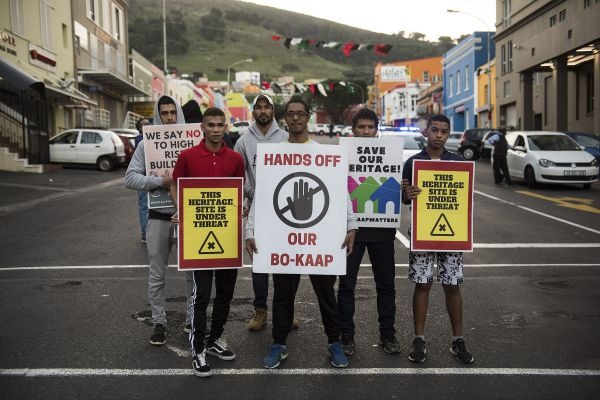Introduction
The Bo-Kaap Protest is intensifying as Cape Town residents speak out against the rapid rise of Airbnb and short-term rental properties in this historic Muslim neighborhood. Bo-Kaap is celebrated for its iconic colorful houses, cobbled streets, and 19 heritage sites that tell the story of centuries-old traditions. However, the influx of short-term rentals is changing the dynamics of daily life. Long-term residents are being displaced, social networks are weakening, and cultural heritage risks being eroded. City authorities are urged to regulate the sector more strictly, but residents are taking matters into their own hands. This article explores nine essential issues behind the Bo-Kaap Protest and why the community is determined to protect its identity.
Bo-Kaap Protest: Protecting Heritage and Culture
Heritage preservation is central to the Bo-Kaap Protest. The neighborhood’s homes, mosques, and streets reflect the history and identity of Cape Town’s Muslim community. The conversion of family homes into Airbnb units threatens the preservation of these sites. Residents fear that tourism-focused commercialization diminishes the authenticity of daily life, turning a vibrant community into a tourist attraction devoid of its living traditions. Protecting heritage is at the core of the protest, ensuring that Bo-Kaap remains a neighborhood with both historical significance and active community life.
Bo-Kaap Protest: Rising Property Costs
Rising property prices are a key concern fueling the Bo-Kaap Protest. The growing demand for short-term rentals drives up housing costs, making it difficult for long-standing residents to remain in the area. Many families who have lived in Bo-Kaap for generations face the possibility of relocating due to unaffordable rent or home prices. The protest highlights how the unchecked growth of Airbnb properties can create socio-economic pressure on local communities. Authorities are being urged to introduce policies that stabilize property costs and protect long-term residents from being priced out.
Bo-Kaap Protest: Community Displacement Risks
Closely linked to property inflation is the risk of community displacement. Long-term residents are increasingly replaced by temporary tenants who occupy homes for short periods. This disrupts the social fabric, diminishing daily interactions and community cohesion. Traditional gatherings, religious practices, and neighborhood networks are undermined. Residents participating in the Bo-Kaap Protest argue that preserving the human aspect of the neighborhood is as important as protecting its physical heritage. Maintaining an engaged, living community is a top priority.
Bo-Kaap Protest: Over-Tourism Challenges
Tourism contributes significantly to the local economy but has unintended consequences in Bo-Kaap. Crowds of visitors daily strain streets, parking, and shared spaces. The Bo-Kaap Protest draws attention to these over-tourism pressures, which affect residents’ quality of life. Tourists often do not adhere to local customs, creating friction and reducing the neighborhood’s sense of normalcy. Calls for sustainable tourism practices are part of the protest’s message, ensuring that visitors experience Bo-Kaap responsibly without compromising its cultural environment.
Bo-Kaap Protest: Regulatory Gaps and Legal Issues
Legal and regulatory challenges are central to the Bo-Kaap Protest. While Cape Town has rules governing short-term rentals, enforcement remains inconsistent. Many property owners operate Airbnb units without proper licenses, occupancy compliance, or accountability. Residents advocate for stricter enforcement, clearer regulations, and penalties for non-compliance. By addressing these gaps, authorities can better manage tourism growth while protecting the community. The protest underscores the importance of strong regulations to safeguard both culture and housing.
Bo-Kaap Protest: Cultural and Social Erosion
Social and cultural erosion is another driving force behind the Bo-Kaap Protest. Daily life, communal gatherings, and local traditions are disrupted when permanent residents are replaced by short-term tenants. Mosques, schools, and community centers depend on active participation, which dwindles as the neighborhood becomes more commercialized. Cultural festivals, storytelling, and intergenerational learning also suffer. Residents emphasize that maintaining social cohesion is essential for preserving Bo-Kaap’s identity, and this concern lies at the heart of the protest movement.
Bo-Kaap Protest: Economic Implications for Locals
The economic effects of Airbnb proliferation are double-edged. While short-term rentals generate revenue and attract tourism, most financial gains bypass local residents. Rising costs, gentrification, and commercial pressures create economic stress for long-term inhabitants. Local businesses may benefit from tourism, but residents often struggle with affordability. The Bo-Kaap Protest calls for equitable economic policies that ensure residents benefit from tourism while safeguarding the neighborhood’s cultural and social integrity. Economic justice is a key component of the community’s advocacy.
Bo-Kaap Protest: Community Mobilization and Activism
Grassroots activism drives the Bo-Kaap Protest. Residents organize petitions, marches, and public campaigns to highlight the impact of Airbnb expansion. Local NGOs and cultural organizations support advocacy efforts, holding municipal authorities accountable. Social media has amplified voices from the neighborhood, drawing national and international attention to the issue. Through collective action, the Bo-Kaap community seeks to influence policy, protect cultural heritage, and maintain neighborhood cohesion. This activism demonstrates the importance of citizen engagement in urban development debates.
Bo-Kaap Protest: Planning for a Sustainable Future
The future of Bo-Kaap depends on balancing tourism growth with heritage preservation and community welfare. Residents advocate for enforceable regulations, sustainable tourism strategies, and protections for long-term housing. Authorities are engaging with stakeholders to ensure future development does not compromise cultural identity. The Bo-Kaap Protest emphasizes that residents must be central to decision-making. A sustainable solution will maintain Bo-Kaap as a vibrant, living neighborhood while allowing responsible tourism and economic opportunity to coexist
FAQs
Q: How can I support the Bo-Kaap Protest?
A: Engage with local campaigns, follow community news, and support petitions for heritage protection.
Q: Are short-term rentals legal in Bo-Kaap?
A: Regulations exist, but enforcement is inconsistent. The Bo-Kaap Protest calls for stricter compliance.
Q: How does the Bo-Kaap Protest affect tourists?
A: It encourages responsible tourism that respects heritage and supports sustainable community practices.
Conclusion
The Bo-Kaap Protest highlights the tension between Airbnb growth and cultural preservation. Residents are determined to protect heritage, maintain affordable housing, and preserve social cohesion. With continued activism, legal reform, and sustainable tourism planning, Cape Town can safeguard Bo-Kaap’s identity while allowing responsible economic growth. Understanding the issues behind the Bo-Kaap Protest is vital for policymakers, residents, and visitors alike. Protecting community and culture will determine the neighborhood’s future as both a heritage site and a living community.



